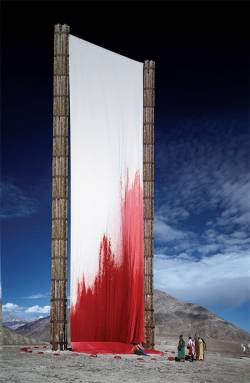The Fall
 Last night I rewatched Tarsem's, The Fall. I first saw it at Edinburgh Film Festival in 2008 amidst a dreamy stream of great films. Starting with a bong toking Ben Kingsley going through a breakup in The Wackness, to a man named Nick discovering the delights of Swedish spiritualism through the painfully funny Three Miles North of Molkom, onto Wayne Wang's 1000 years of Good Prayers, taking its title from the ancient Chinese saying 'true love comes once in a thousand years of good prayers'. Then before the festival was done I was back in Sweden with Let the Right One In, and finally Wall*E, Pixar's first proper romance and a brutal anti-capitalist statement to boot.
Last night I rewatched Tarsem's, The Fall. I first saw it at Edinburgh Film Festival in 2008 amidst a dreamy stream of great films. Starting with a bong toking Ben Kingsley going through a breakup in The Wackness, to a man named Nick discovering the delights of Swedish spiritualism through the painfully funny Three Miles North of Molkom, onto Wayne Wang's 1000 years of Good Prayers, taking its title from the ancient Chinese saying 'true love comes once in a thousand years of good prayers'. Then before the festival was done I was back in Sweden with Let the Right One In, and finally Wall*E, Pixar's first proper romance and a brutal anti-capitalist statement to boot.
And because of the strengths of all these films I never got round to writing about how much I liked The Fall. It is easy to dismiss it at first glance as the camp melodrama of a music video director, hungry to clock airmiles to shoot eye candy in the most exotic places his lucky location team could find. But beneath the lush visuals is the story of a suicidal and heartbroken man trying to find a reason to live, and how his imagination, and the encouragement of his good hearted friend, help him.
As such it is a film that can be read well at any of three levels: as a visual work of cinema, as a drama and as a philosophical statement. It is most easy to connect with the timeless love story, spanning the cultures of the world, indulgently told against nature's finest backdrops with the screen a canvas for Tarsem to dip his brush through a dazzling display of costume design, architecture, colour and sweeping choreography. But this world exists for Roy to describe his suffering and failed romance to a young girl who barely understands what's happening around her, yet is knowing enough to try to save him. We are not invited to share his pain and there is little sense of self-pity about him - indeed his epic narrations are a suitable backdrop for his romantic anguish: these are epic emotions he is struggling with; lofty and passionate, ridiculous, even, but not whimpering and pathetic.
But in illustrating this, the power of imagination in escaping from a painful reality, reveals the movie's core (in my view) message about the importance of story telling and the imagination and how it can reflect and even heal our present situation. Backdropped against the birth of the Californian studio system, by a bunch of copyright dodgers and cinema rebels escaping from the East Coast, the film is a hymn to the once revolutionary artform, its power and restorative qualities: the latest evolution of form for telling the 'epic legend' that has bonded societies since they first formed.
It's a film worth getting for yourself and your friends, not only to ensure such films keep being made, but because it's a tribute to the imagine that you'll doubtless want to watch again and again.
It must be Oscar day.. this almost reads like one of those wordy sections of the ceremony when trying to explain to the audience why the work of the Art Director is so important.